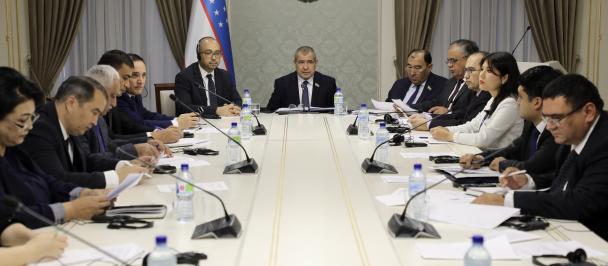Strengthening capacity for reducing inequalities in Uzbekistan: A Multidimensional Poverty Measurement Workshop
September 29, 2023

The United Nations Development Programme (UNDP) and the Oxford Poverty and Human Development Initiative (OPHI) concluded a transformative five-day workshop in Tashkent, Uzbekistan, aimed at enhancing the country’s approach to multidimensional poverty measurement and reduction. The workshop, held from September 25th to 29th, 2023, brought together an array of policy professionals, statistics officers, and technical experts from key Uzbekistan institutions, including the Ministry of Employment and Poverty Reduction, the National Agency for Social Protection, the Statistics Agency, the Centre for Economic Research and Reforms, and the Center for Policy Research and Outreach of Westminster International University in Tashkent (WIUT).

The workshop centered around the conceptual and technical intricacies of multidimensional poverty measurement, with a particular focus on the practical implementation and utilization of multidimensional measures for pro-poor policymaking. Guided by renowned experts Prof. Corinne Mitchell, Director of Programmes and Operations at OPHI, and Fanni Kovesdi, Research Analyst at OPHI, participants delved into the nuances of the Alkire-Foster (AF) Method, gaining in-depth knowledge on designing, computing, and analyzing a Multidimensional Poverty Index (MPI).
The agenda spanned two crucial aspects: Policy Training and Technical Training. The Policy Training sessions, held on the first two days, provided a comprehensive overview of multidimensional poverty measurement, its significance in the context of the 2030 agenda (SDGs), and its complementarity to monetary measures of poverty. Participants also explored normative decisions in MPIs, global and national MPIs and best practices, stakeholder mapping, policy uses of MPIs, and institutionalization strategies tailored for Uzbekistan.
With the organizational support of WIUT, the subsequent Technical Training that took the remaining three days, bridged the policy part with the technical aspects of constructing and computing a national MPI using Stata1. The sessions covered essential topics such as data requirements, indicator design, deprivation matrix creation, association and redundancy analysis, and robustness analysis. Through interactive exercises, participants honed their skills in constructing sample indicators and estimating MPIs, ensuring a hands-on and immersive learning experience.

Anas Fayyad Qarman, UNDP Resident Representative a.i. in Uzbekistan, highlighted the workshop's significance in his opening remarks, emphasizing the importance of a multidimensional approach to poverty reduction. He underscored that the workshop not only represented a technical endeavor but also a moral imperative, bringing together experts and stakeholders in a shared commitment to empowering Uzbekistan's development journey through transformative power of knowledge, collaboration, and innovation.
This initiative was made possible through the generous support of the governments of Luxembourg and the Republic of Korea, channelled via UNDP's Funding Windows. It aligns seamlessly with Uzbekistan's ambitious goals outlined in the New Uzbekistan Development Strategy 2022-2026, as well as the Uzbekistan 2030 strategy, reinforcing the nation's commitment to halving poverty and reducing inequalities comprehensively, as well as to make Uzbekistan an upper-middle income country by 2030.
The workshop's outcomes, including the training and expertise gained by Uzbekistan's professionals, mark a significant step towards a more inclusive, equitable, and prosperous Uzbekistan. The insights gathered during the workshop will serve as a foundation for evidence-based policymaking, ensuring a brighter future for all citizens.
More about the project: Addressing socio-economic inequalities at the time of global and regional instabilities

 Locations
Locations













